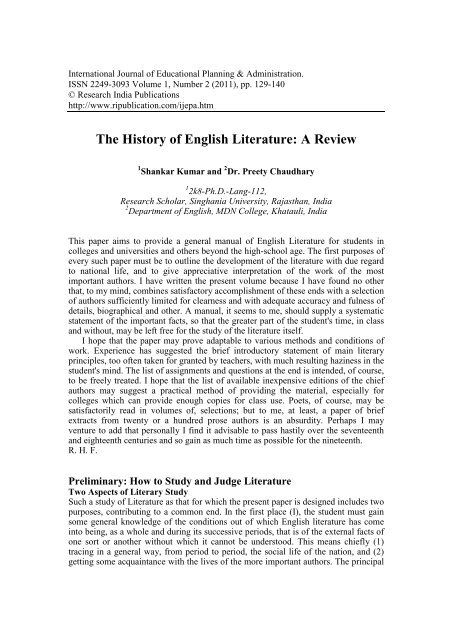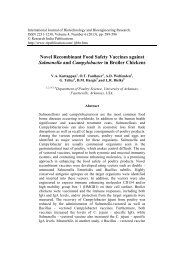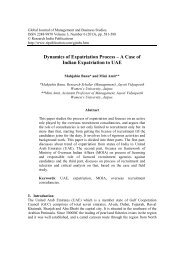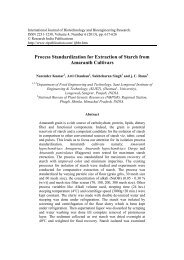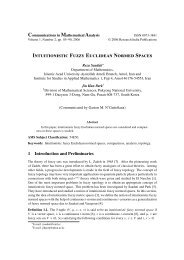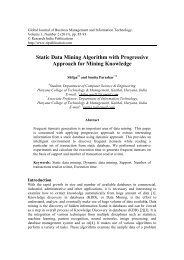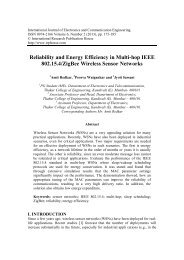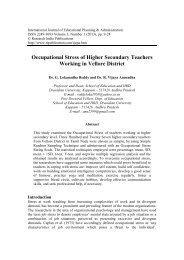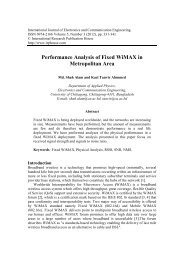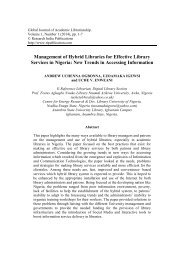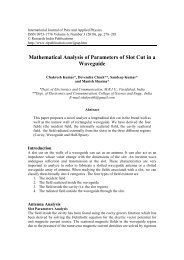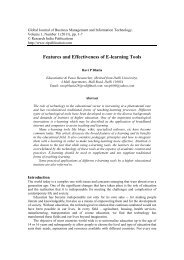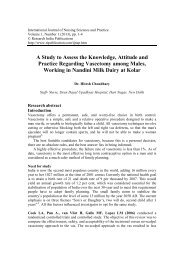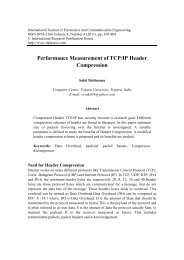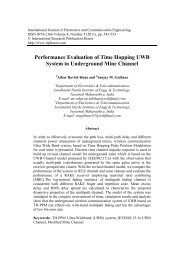The History of English Literature: A Review - Ripublication.com
The History of English Literature: A Review - Ripublication.com
The History of English Literature: A Review - Ripublication.com
Create successful ePaper yourself
Turn your PDF publications into a flip-book with our unique Google optimized e-Paper software.
International Journal <strong>of</strong> Educational Planning & Administration.<br />
ISSN 2249-3093 Volume 1, Number 2 (2011), pp. 129-140<br />
© Research India Publications<br />
http://www.ripublication.<strong>com</strong>/ijepa.htm<br />
<strong>The</strong> <strong>History</strong> <strong>of</strong> <strong>English</strong> <strong>Literature</strong>: A <strong>Review</strong><br />
1 Shankar Kumar and 2 Dr. Preety Chaudhary<br />
1 2k8-Ph.D.-Lang-112,<br />
Research Scholar, Singhania University, Rajasthan, India<br />
2 Department <strong>of</strong> <strong>English</strong>, MDN College, Khatauli, India<br />
This paper aims to provide a general manual <strong>of</strong> <strong>English</strong> <strong>Literature</strong> for students in<br />
colleges and universities and others beyond the high-school age. <strong>The</strong> first purposes <strong>of</strong><br />
every such paper must be to outline the development <strong>of</strong> the literature with due regard<br />
to national life, and to give appreciative interpretation <strong>of</strong> the work <strong>of</strong> the most<br />
important authors. I have written the present volume because I have found no other<br />
that, to my mind, <strong>com</strong>bines satisfactory ac<strong>com</strong>plishment <strong>of</strong> these ends with a selection<br />
<strong>of</strong> authors sufficiently limited for clearness and with adequate accuracy and fulness <strong>of</strong><br />
details, biographical and other. A manual, it seems to me, should supply a systematic<br />
statement <strong>of</strong> the important facts, so that the greater part <strong>of</strong> the student's time, in class<br />
and without, may be left free for the study <strong>of</strong> the literature itself.<br />
I hope that the paper may prove adaptable to various methods and conditions <strong>of</strong><br />
work. Experience has suggested the brief introductory statement <strong>of</strong> main literary<br />
principles, too <strong>of</strong>ten taken for granted by teachers, with much resulting haziness in the<br />
student's mind. <strong>The</strong> list <strong>of</strong> assignments and questions at the end is intended, <strong>of</strong> course,<br />
to be freely treated. I hope that the list <strong>of</strong> available inexpensive editions <strong>of</strong> the chief<br />
authors may suggest a practical method <strong>of</strong> providing the material, especially for<br />
colleges which can provide enough copies for class use. Poets, <strong>of</strong> course, may be<br />
satisfactorily read in volumes <strong>of</strong>, selections; but to me, at least, a paper <strong>of</strong> brief<br />
extracts from twenty or a hundred prose authors is an absurdity. Perhaps I may<br />
venture to add that personally I find it advisable to pass hastily over the seventeenth<br />
and eighteenth centuries and so gain as much time as possible for the nineteenth.<br />
R. H. F.<br />
Preliminary: How to Study and Judge <strong>Literature</strong><br />
Two Aspects <strong>of</strong> Literary Study<br />
Such a study <strong>of</strong> <strong>Literature</strong> as that for which the present paper is designed includes two<br />
purposes, contributing to a <strong>com</strong>mon end. In the first place (I), the student must gain<br />
some general knowledge <strong>of</strong> the conditions out <strong>of</strong> which <strong>English</strong> literature has <strong>com</strong>e<br />
into being, as a whole and during its successive periods, that is <strong>of</strong> the external facts <strong>of</strong><br />
one sort or another without which it cannot be understood. This means chiefly (1)<br />
tracing in a general way, from period to period, the social life <strong>of</strong> the nation, and (2)<br />
getting some acquaintance with the lives <strong>of</strong> the more important authors. <strong>The</strong> principal
130 Shankar Kumar and Dr. Preety Chaudhary<br />
thing, however (II), is the direct study <strong>of</strong> the literature itself. This study in turn should<br />
aim first at an understanding <strong>of</strong> the literature as an expression <strong>of</strong> the authors' views <strong>of</strong><br />
life and <strong>of</strong> their personalities and especially as a portrayal and interpretation <strong>of</strong> the life<br />
<strong>of</strong> their periods and <strong>of</strong> all life as they have seen it; it should aim further at an<br />
appreciation <strong>of</strong> each literary work as a product <strong>of</strong> Fine Art, appealing with peculiar<br />
power both to our minds and to our emotions, not least to the sense <strong>of</strong> Beauty and the<br />
whole higher nature. In the present paper, it should perhaps be added, the word<br />
<strong>Literature</strong> is generally interpreted in the strict sense, as including only writing <strong>of</strong><br />
permanent significance and beauty.<br />
<strong>The</strong> outline discussion <strong>of</strong> literary qualities which follows is intended to help in the<br />
formation <strong>of</strong> intelligent and appreciative judgments.<br />
Substance and Form<br />
<strong>The</strong> most thoroughgoing <strong>of</strong> all distinctions in literature, as in the other Fine Arts, is<br />
that between (1) Substance, the essential content and meaning <strong>of</strong> the work, and (2)<br />
Form, the manner in which it is expressed (including narrative structure, external<br />
style, in poetry verse-form, and many related matters). This distinction should be kept<br />
in mind, but in what follows it will not be to our purpose to emphasize it.<br />
General Matters<br />
First and always in considering any piece <strong>of</strong> literature a student should ask himself the<br />
question already implied: Does it present a true portrayal <strong>of</strong> life--<strong>of</strong> the permanent<br />
elements in all life and in human nature, <strong>of</strong> the life or thought <strong>of</strong> its own particular<br />
period, and (in most sorts <strong>of</strong> papers) <strong>of</strong> the persons, real or imaginary, with whom it<br />
deals? If it properly ac<strong>com</strong>plishes this main purpose, when the reader finishes it he<br />
should feel that his understanding <strong>of</strong> life and <strong>of</strong> people has been increased and<br />
broadened. But it should always be remembered that truth is quite as much a matter <strong>of</strong><br />
general spirit and impression as <strong>of</strong> literal accuracy in details <strong>of</strong> fact. <strong>The</strong> essential<br />
question is not, Is the presentation <strong>of</strong> life and character perfect in a photographic<br />
fashion? but Does it convey the underlying realities?<br />
Other things being equal, the value <strong>of</strong> a paper, and especially <strong>of</strong> an author's whole<br />
work, is proportional to its range, that is to the breadth and variety <strong>of</strong> the life and<br />
characters which it presents.<br />
A student should not form his judgments merely from what is technically called<br />
the dogmatic point <strong>of</strong> view, but should try rather to adopt that <strong>of</strong> historical criticism.<br />
This means that he should take into account the limitations imposed on every author<br />
by the age in which he lived. If you find that the poets <strong>of</strong> the Anglo-Saxon 'Beowulf'<br />
have given a clear and interesting picture <strong>of</strong> the life <strong>of</strong> our barbarous ancestors <strong>of</strong> the<br />
sixth or seventh century A. D., you should not blame them for a lack <strong>of</strong> the finer<br />
elements <strong>of</strong> feeling and expression which after a thousand years <strong>of</strong> civilization<br />
distinguish such delicate spirits as Keats and Tennyson.<br />
It is <strong>of</strong>ten important to consider also whether the author's personal method is<br />
objective, which means that he presents life and character without bias; or subjective,<br />
coloring his work with his personal tastes, feelings and impressions. Subjectivity may<br />
be a falsifying influence, but it may also be an important virtue, adding intimacy,<br />
charm, or force.<br />
Further, one may ask whether the author has a deliberately formed theory <strong>of</strong> life;<br />
and if so how it shows itself, and, <strong>of</strong> course, how sound it is.
<strong>The</strong> <strong>History</strong> <strong>of</strong> <strong>English</strong> <strong>Literature</strong>: A <strong>Review</strong> 131<br />
Intellect, Emotion, Imagination and Related Qualities<br />
Another main question in judging any paper concerns the union which it shows: (1) <strong>of</strong><br />
the Intellectual faculty, that which enables the author to understand and control his<br />
material and present it with directness and clearness; and (2) <strong>of</strong> the Emotion, which<br />
gives warmth, enthusiasm, and appealing human power. <strong>The</strong> relative proportions <strong>of</strong><br />
these two faculties vary greatly in papers <strong>of</strong> different sorts. Exposition (as in most<br />
essays) cannot as a rule be permeated with so much emotion as narration or, certainly,<br />
as lyric poetry. In a great paper the relation <strong>of</strong> the two faculties will <strong>of</strong> course properly<br />
correspond to form and spirit. Largely a matter <strong>of</strong> Emotion is the Personal Sympathy<br />
<strong>of</strong> the author for his characters, while Intellect has a large share in Dramatic<br />
Sympathy, whereby the author enters truly into the situations and feelings <strong>of</strong> any<br />
character, whether he personally likes him or not. Largely made up <strong>of</strong> Emotion are:<br />
(1) true Sentiment, which is fine feeling <strong>of</strong> any sort, and which should not degenerate<br />
into Sentimentalism (exaggerated tender feeling); (2) Humor, the instinctive sense for<br />
that which is amusing; and (3) the sense for Pathos. Pathos differs from Tragedy in<br />
that Tragedy (whether in a drama or elsewhere) is the suffering <strong>of</strong> persons who are<br />
able to struggle against it, Pathos the suffering <strong>of</strong> those persons (children, for<br />
instance) who are merely helpless victims. Wit, the brilliant perception <strong>of</strong><br />
incongruities, is a matter <strong>of</strong> Intellect and the <strong>com</strong>plement <strong>of</strong> Humor.<br />
Imagination and Fancy<br />
Related to Emotion also and one <strong>of</strong> the most necessary elements in the higher forms<br />
<strong>of</strong> literature is Imagination, the faculty <strong>of</strong> making what is absent or unreal seem<br />
present and real, and revealing the hidden or more subtile forces <strong>of</strong> life. Its main<br />
operations may be classified under three heads: (1) Pictorial and Presentative. It<br />
presents to the author's mind, and through him to the minds <strong>of</strong> his readers, all the<br />
elements <strong>of</strong> human experience and life (drawing from his actual experience or his<br />
reading). 2. Selective, Associative, and Constructive. From the unorganized material<br />
thus brought clearly to the author's consciousness Imagination next selects the details<br />
which can be turned to present use, and proceeds to <strong>com</strong>bine them, uniting scattered<br />
traits and incidents, perhaps from widely different sources, into new characters,<br />
stories, scenes, and ideas. <strong>The</strong> characters <strong>of</strong> 'Silas Marner,' for example, never had an<br />
actual existence, and the precise incidents <strong>of</strong> the story never took place in just that<br />
order and fashion, but they were all constructed by the author's imagination out <strong>of</strong><br />
what she had observed <strong>of</strong> many real persons and events, and so make, in the most<br />
significant sense, a true picture <strong>of</strong> life. 3. Penetrative and Interpretative. In its subtlest<br />
operations, further, Imagination penetrates below the surface and <strong>com</strong>prehends and<br />
brings to light the deeper forces and facts--the real controlling instincts <strong>of</strong> characters,<br />
the real motives for actions, and the relations <strong>of</strong> material things to those <strong>of</strong> the<br />
spiritual world and <strong>of</strong> Man to Nature and God.<br />
Fancy may for convenience be considered as a distinct faculty, though it is really<br />
the lighter, partly superficial, aspect <strong>of</strong> Imagination. It deals with things not<br />
essentially or significantly true, amusing us with striking or pleasing suggestions,<br />
such as seeing faces in the clouds, which vanish almost as soon as they are discerned.<br />
Both Imagination and Fancy naturally express themselves, <strong>of</strong>ten and effectively,
132 Shankar Kumar and Dr. Preety Chaudhary<br />
through the use <strong>of</strong> metaphors, similes, and suggestive condensed language. In painful<br />
contrast to them stands <strong>com</strong>monplaceness, always a fatal fault.<br />
Idealism, Romance and Realism<br />
Among the most important literary qualities also are Idealism, Romance, and Realism.<br />
Realism, in the broad sense, means simply the presentation <strong>of</strong> the actual, depicting life<br />
as one sees it, objectively, without such selection as aims deliberately to emphasize<br />
some particular aspects, such as the pleasant or attractive ones. (Of course all<br />
literature is necessarily based on the ordinary facts <strong>of</strong> life, which we may call by the<br />
more general name <strong>of</strong> Reality.) Carried to the extreme, Realism may be<strong>com</strong>e ignoble,<br />
dealing too frankly or in unworthy spirit with the baser side <strong>of</strong> reality, and in almost<br />
all ages this sort <strong>of</strong> Realism has actually attempted to assert itself in literature.<br />
Idealism, the tendency opposite to Realism, seeks to emphasize the spiritual and other<br />
higher elements, <strong>of</strong>ten to bring out the spiritual values which lie beneath the surface.<br />
It is an optimistic interpretation <strong>of</strong> life, looking for what is good and permanent<br />
beneath all the surface confusion. Romance may be called Idealism in the realm <strong>of</strong><br />
sentiment. It aims largely to interest and delight, to throw over life a pleasing glamor;<br />
it generally deals with love or heroic adventure; and it generally locates its scenes and<br />
characters in distant times and places, where it can work unhampered by our<br />
consciousness <strong>of</strong> the humdrum actualities <strong>of</strong> our daily experience. It may always be<br />
asked whether a writer <strong>of</strong> Romance makes his world seem convincingly real as we<br />
read or whether he frankly abandons all plausibility. <strong>The</strong> presence or absence <strong>of</strong> a<br />
supernatural element generally makes an important difference. Entitled to special<br />
mention, also, is spiritual Romance, where attention is centered not on external<br />
events, which may here be treated in somewhat shadowy fashion, but on the deeper<br />
questions <strong>of</strong> life. Spiritual Romance, therefore, is essentially idealistic.<br />
Dramatic Power<br />
Dramatic power, in general, means the presentation <strong>of</strong> life with the vivid active reality<br />
<strong>of</strong> life and character which especially distinguishes the acted drama. It is, <strong>of</strong> course,<br />
one <strong>of</strong> the main things to be desired in most narrative; though sometimes the effect<br />
sought may be something different, as, for instance, in romance and poetry, an<br />
atmosphere <strong>of</strong> dreamy beauty. In a drama, and to some extent in other forms <strong>of</strong><br />
narrative, dramatic power culminates in the ability to bring out the great crises with<br />
supreme effectiveness.<br />
Characters<br />
<strong>The</strong>re is, generally speaking, no greater test <strong>of</strong> an author's skill than his knowledge<br />
and presentation <strong>of</strong> characters. We should consider whether he makes them (1) merely<br />
caricatures, or (2) type characters, standing for certain general traits <strong>of</strong> human nature<br />
but not convincingly real or especially significant persons, or (3) genuine individuals<br />
with all the inconsistencies and half-revealed tendencies that in actual life belong to<br />
real personality. Of course in the case <strong>of</strong> important characters, the greater the genuine<br />
individuality the greater the success. But with secondary characters the principles <strong>of</strong><br />
emphasis and proportion generally forbid very distinct individualization; and
<strong>The</strong> <strong>History</strong> <strong>of</strong> <strong>English</strong> <strong>Literature</strong>: A <strong>Review</strong> 133<br />
sometimes, especially in <strong>com</strong>edy (drama), truth <strong>of</strong> character is properly sacrificed to<br />
other objects, such as the main effect. It may also be asked whether the characters are<br />
simple, as some people are in actual life, or <strong>com</strong>plex, like most interesting persons;<br />
whether they develop, as all real people must under the action <strong>of</strong> significant<br />
experience, or whether the author merely presents them in brief situations or lacks the<br />
power to make them anything but stationary. If there are several <strong>of</strong> them it is a further<br />
question whether the author properly contrasts them in such a way as to secure<br />
interest. And a main requisite is that he shall properly motivate their actions, that is<br />
make their actions result naturally from their characters, either their controlling traits<br />
or their temporary impulses.<br />
Structure<br />
In any work <strong>of</strong> literature there should be definite structure. This requires, (1) Unity,<br />
(2) Variety, (3) Order, (4) Proportion, and (5) due Emphasis <strong>of</strong> parts. Unity means<br />
that everything included in the work ought to contribute directly or indirectly to the<br />
main effect. Very <strong>of</strong>ten a definite theme may be found about which the whole work<br />
centers, as for instance in 'Macbeth,' <strong>The</strong> Ruin <strong>of</strong> a Man through Yielding to Evil.<br />
Sometimes, however, as in a lyric poem, the effect intended may be the rendering or<br />
creation <strong>of</strong> a mood, such as that <strong>of</strong> happy content, and in that case the poem may not<br />
have an easily expressible concrete theme.<br />
Order implies a proper beginning, arrangement, progress, and a definite ending. In<br />
narrative, including all stories whether in prose or verse and also the drama, there<br />
should be traceable a Line <strong>of</strong> Action, <strong>com</strong>prising generally: (1) an Introduction,<br />
stating the necessary preliminaries; (2) the Initial Impulse, the event which really sets<br />
in motion this particular story; (3) a Rising Action; (4) a Main Climax. Sometimes<br />
(generally, in Comedy) the Main Climax is identical with the Out<strong>com</strong>e; sometimes<br />
(regularly in Tragedy) the Main Climax is a turning point and <strong>com</strong>es near the middle<br />
<strong>of</strong> the story. In that case it really marks the beginning <strong>of</strong> the success <strong>of</strong> the side which<br />
is to be victorious at the end (in Tragedy the side opposed to the hero) and it initiates<br />
(5) a Falling Action, corresponding to the Rising Action, and sometimes <strong>of</strong> much the<br />
same length, wherein the losing side struggles to maintain itself. After (6) the<br />
Out<strong>com</strong>e, may <strong>com</strong>e (7) a brief tranquilizing Conclusion. <strong>The</strong> Antecedent Action is<br />
that part <strong>of</strong> the characters' experiences which precedes the events <strong>of</strong> the story. If it has<br />
a bearing, information about it must be given either in the Introduction or incidentally<br />
later on. Sometimes, however, the structure just indicated may not be followed; a<br />
story may begin in the middle, and the earlier part may be told later on in retrospect,<br />
or incidentally indicated, like the Antecedent Action.<br />
If in any narrative there is one or more Secondary Action, a story which might be<br />
separated from the Main Action and viewed as <strong>com</strong>plete in itself, criticism should<br />
always ask whether the Main and Secondary Actions are properly unified. In the<br />
strictest theory there should be an essential connection between them; for instance,<br />
they may illustrate different and perhaps contrasting aspects <strong>of</strong> the general theme.<br />
Often, however, an author introduces a Secondary Action merely for the sake <strong>of</strong><br />
variety or to increase the breadth <strong>of</strong> his picture--in order to present a whole section <strong>of</strong><br />
society instead <strong>of</strong> one narrow stratum or group. In such cases, he must generally be
134 Shankar Kumar and Dr. Preety Chaudhary<br />
judged to have succeeded if he has established an apparent unity, say by mingling the<br />
same characters in the two actions, so that readers are not readily conscious <strong>of</strong> the<br />
lack <strong>of</strong> real structural unity.<br />
Other things to be considered in narrative are: Movement, which, unless for<br />
special reasons, should be rapid, at least not slow and broken; Suspense; general<br />
Interest; and the questions whether or not there are good situations and good minor<br />
climaxes, contributing to the interest; and whether or not motivation is good, apart<br />
from that which results from character, that is whether events are properly represented<br />
as happening in accordance with the law <strong>of</strong> cause and effect which inexorably<br />
governs actual life. But it must always be remembered that in such writing as Comedy<br />
and Romance the strict rules <strong>of</strong> motivation must be relaxed, and indeed in all<br />
literature, even in Tragedy, the idealization, condensation, and heightening which are<br />
the proper methods <strong>of</strong> Art require them to be slightly modified.<br />
Descriptive Power<br />
Usually secondary in appearance but <strong>of</strong> vital artistic importance, is the author's power<br />
<strong>of</strong> description, <strong>of</strong> picturing both the appearance <strong>of</strong> his characters and the scenes which<br />
make his background and help to give the tone <strong>of</strong> his work. Perhaps four subjects <strong>of</strong><br />
description may be distinguished:<br />
External Nature<br />
Here such questions as the following are <strong>of</strong> varying importance, according to the<br />
character and purpose <strong>of</strong> the work: Does the author know and care for Nature and<br />
frequently introduce descriptions? Are the descriptions concrete and accurate, or on<br />
the other hand purposely general (impressionistic) or carelessly superficial? Do they<br />
give fine variations <strong>of</strong> appearance and impression, such as delicate shiftings <strong>of</strong> light<br />
and shade and delicate tones <strong>of</strong> color? Are they powerfully sensuous, that is do they<br />
appeal strongly to the physical senses, <strong>of</strong> sight (color, light, and movement), sound<br />
(including music), smell, taste, touch, and general physical sensation? How great is<br />
their variety? Do they deal with many parts <strong>of</strong> Nature, for example the sea,<br />
mountains, plains, forests, and clouds? Is the love <strong>of</strong> external beauty a passion with<br />
the author? What is the author's attitude toward Nature--(1) does he view Nature in a<br />
purely objective way, as a mass <strong>of</strong> material things, a series <strong>of</strong> material phenomena or<br />
a mere embodiment <strong>of</strong> sensuous beauty; or (2) is there symbolism or mysticism in his<br />
attitude, that is--does he view Nature with awe as a spiritual power; or (3) is he<br />
thoroughly subjective, reading his own moods into Nature or using Nature chiefly for<br />
the expression <strong>of</strong> his moods? Or again, does the author describe with merely<br />
expository purpose, to make the background <strong>of</strong> his work clear?<br />
Individual Persons and Human Life<br />
Is the author skilful in descriptions <strong>of</strong> personal appearance and dress? Does he<br />
produce his impressions by full enumeration <strong>of</strong> details, or by emphasis on prominent<br />
or characteristic details? How <strong>of</strong>ten and how fully does he describe scenes <strong>of</strong> human<br />
activity (such as a street scene, a social gathering, a procession on the march)?<br />
How frequent and how vivid are his descriptions <strong>of</strong> the inanimate background <strong>of</strong>
<strong>The</strong> <strong>History</strong> <strong>of</strong> <strong>English</strong> <strong>Literature</strong>: A <strong>Review</strong> 135<br />
human life--buildings, interiors <strong>of</strong> rooms, and the rest? 4. Does the author skilfully<br />
use description to create the general atmosphere in which he wishes to invest his<br />
work--an atmosphere <strong>of</strong> cheerfulness, <strong>of</strong> mystery, <strong>of</strong> activity, or any <strong>of</strong> a hundred<br />
other moods?<br />
Style<br />
Style in general means 'manner <strong>of</strong> writing.' In the broad sense it includes everything<br />
pertaining to the author's spirit and point <strong>of</strong> view--almost everything which is here<br />
being discussed. More narrowly considered, as 'external style,' it designates the<br />
author's use <strong>of</strong> language. Questions to be asked in regard to external style are such as<br />
these: Is it good or bad, careful or careless, clear and easy or confused and difficult;<br />
simple or <strong>com</strong>plex; terse and forceful (perhaps colloquial) or involved and stately;<br />
eloquent, balanced, rhythmical; vigorous, or musical, languid, delicate and decorative;<br />
varied or monotonous; plain or figurative; poor or rich in connotation and poetic<br />
suggestiveness; beautiful, or only clear and strong? Are the sentences mostly long or<br />
short; periodic or loose; mostly <strong>of</strong> one type, such as the declarative, or with frequent<br />
introduction <strong>of</strong> such other forms as the question and the exclamation?<br />
Poetry<br />
Most <strong>of</strong> what has thus far been said applies to both Prose and Poetry. But in Poetry, as<br />
the literature especially characterized in general by high Emotion, Imagination, and<br />
Beauty, finer and more delicate effects are to be sought than in Prose. Poetry,<br />
generally speaking, is the expression <strong>of</strong> the deeper nature; it belongs peculiarly to the<br />
realm <strong>of</strong> the spirit. On the side <strong>of</strong> poetical expression such imaginative figures <strong>of</strong><br />
speech as metaphors and similes, and such devices as alliteration, prove especially<br />
helpful. It may be asked further <strong>of</strong> poetry, whether the meter and stanza structure are<br />
appropriate to the mood and thought and so handled as to bring out the emotion<br />
effectively; and whether the sound is adapted to the sense (for example, musical<br />
where the idea is <strong>of</strong> peace or quiet beauty). If the sound <strong>of</strong> the words actually imitates<br />
the sound <strong>of</strong> the thing indicated, the effect is called Onomatopoeia. Among kinds <strong>of</strong><br />
poetry, according to form, the most important are: (1) Narrative, which includes many<br />
subordinate forms, such as the Epic. (2) Lyric. Lyric poems are expressions <strong>of</strong><br />
spontaneous emotion and are necessarily short. (3) Dramatic, including not merely the<br />
drama but all poetry <strong>of</strong> vigorous action. (4) Descriptive, like Goldsmith's 'Deserted<br />
Village' and Tennyson's 'Dream <strong>of</strong> Fair Women.' Minor kinds are: (5) Satiric; and (6)<br />
Didactic.<br />
Highly important in poetry is Rhythm, but the word means merely 'flow,' so that<br />
rhythm belongs to prose as well as to poetry. Good rhythm is merely a pleasing<br />
succession <strong>of</strong> sounds. Meter, the distinguishing formal mark <strong>of</strong> poetry and all verse, is<br />
merely rhythm which is regular in certain fundamental respects, roughly speaking is<br />
rhythm in which the recurrence <strong>of</strong> stressed syllables or <strong>of</strong> feet with definite timevalues<br />
is regular. <strong>The</strong>re is no proper connection either in spelling or in meaning<br />
between rhythm and rime (which is generally misspelled 'rhyme'). <strong>The</strong> adjective<br />
derived from 'rhythm' is 'rhythmical'; there is no adjective from 'rime' except 'rimed.'<br />
<strong>The</strong> word 'verse' in its general sense includes all writing in meter. Poetry is that verse
136 Shankar Kumar and Dr. Preety Chaudhary<br />
which has real literary merit. In a very different and narrower sense 'verse' means<br />
'line' (never properly 'stanza').<br />
Classicism and Romanticism<br />
Two <strong>of</strong> the most important contrasting tendencies <strong>of</strong> style in the general sense are<br />
Classicism and Romanticism. Classicism means those qualities which are most<br />
characteristic <strong>of</strong> the best literature <strong>of</strong> Greece and Rome. It is in fact partly identical<br />
with Idealism. It aims to express the inner truth or central principles <strong>of</strong> things, without<br />
anxiety for minor details, and it is by nature largely intellectual in quality, though not<br />
by any means to the exclusion <strong>of</strong> emotion. In outward form, therefore, it insists on<br />
correct structure, restraint, careful finish and avoidance <strong>of</strong> all excess. 'Paradise Lost,'<br />
Arnold's 'Sohrab and Rustum,' and Addison's essays are modern examples.<br />
Romanticism, which in general prevails in modern literature, lays most emphasis on<br />
independence and fulness <strong>of</strong> expression and on strong emotion, and it may be<br />
<strong>com</strong>paratively careless <strong>of</strong> form. <strong>The</strong> Classical style has well been called<br />
sculpturesque, the Romantic picturesque. <strong>The</strong> virtues <strong>of</strong> the Classical are<br />
exquisiteness and incisive significance; <strong>of</strong> the Romantic, richness and splendor. <strong>The</strong><br />
dangers <strong>of</strong> the Classical are coldness and formality; <strong>of</strong> the Romantic, over-luxuriance,<br />
formlessness and excess <strong>of</strong> emotion.<br />
A Tabular View <strong>of</strong> <strong>English</strong> <strong>Literature</strong><br />
<strong>The</strong> Britons and the Anglo-Saxon Period, from the beginning to the Norman<br />
Conquest in 1066 A. D.<br />
• <strong>The</strong> Britons, before and during the Roman occupation, to the fifth century.<br />
• Anglo-Saxon Poetry, on the Continent in prehistoric times before the migration<br />
to England, and in England especially during the Northumbrian Period, seventh<br />
and eighth centuries A. D. Ballads, 'Beowulf,' Caedmon, Bede (Latin prose),<br />
Cynewulf.<br />
• Anglo-Saxon Prose, <strong>of</strong> the West Saxon Period, tenth and eleventh centuries,<br />
beginning with King Alfred, 871-901.<br />
o <strong>The</strong> Anglo-Saxon Chronicle.<br />
<strong>The</strong> Norman-French, Period, 1066 to about 1350.<br />
• <strong>Literature</strong> in Latin, French, and <strong>English</strong>.<br />
• Many different forms, both religious and secular, including the religious drama.<br />
• <strong>The</strong> Metrical Romances, including the Arthurian Cycle.<br />
• Ge<strong>of</strong>frey <strong>of</strong> Monmouth, 'Historia Regum Britanniae' (Latin), about 1136.<br />
• Wace, 'Brut' (French), about 1155.<br />
• Laghamon, 'Brut' (<strong>English</strong>), about 1200.<br />
<strong>The</strong> End <strong>of</strong> the Middle Ages, about 1350 to about 1500.<br />
• <strong>The</strong> Hundred Years' War.<br />
• 'Sir John Mandeyille's' 'Voyage.'<br />
• Chaucer, 1338-1400.
<strong>The</strong> <strong>History</strong> <strong>of</strong> <strong>English</strong> <strong>Literature</strong>: A <strong>Review</strong> 137<br />
• John Gower.<br />
• '<strong>The</strong> Vision Concerning Piers the Plowman.'<br />
• Wiclif and the Lollard Bible, about 1380.<br />
• Popular Ballads.<br />
• <strong>The</strong> War <strong>of</strong> the Roses.<br />
• Malory's 'Morte Darthur,' finished 1467.<br />
• Caxton and the printing press, 1476.<br />
• Morality Plays and Interludes.<br />
<strong>The</strong> Renaissance and the Elizabethan Period, about 1500 to 1603.<br />
• Great discoveries and activity, both intellectual and physical.<br />
o Influence <strong>of</strong> Italy.<br />
o <strong>The</strong> Reformation.<br />
• Henry VIII, 1509-47.<br />
o Edward VI, to 1553.<br />
o Mary, to 1558.<br />
o Elizabeth, 1558-1603.<br />
o Defeat <strong>of</strong> the Armada, 1588.<br />
• Sir Thomas More, 'Utopia.'<br />
o Tyndale's New Testament and other translations <strong>of</strong> the Bible.<br />
• Wyatt and Surrey, about 1540.<br />
• Prose Fiction.<br />
o Lyly's 'Euphues,' 1578.<br />
o Sidney's 'Arcadia.'<br />
• Spenser, 1552-1599.<br />
o '<strong>The</strong> Shepherd's Calendar,' 1579.<br />
o '<strong>The</strong> Faerie Queene,' 1590 and later.<br />
• Lyric poetry, including sonnet sequences.<br />
o John Donne.<br />
• <strong>The</strong> Drama.<br />
o Classical and native influences.<br />
o Lyly, Peele, Greene, Marlowe.<br />
o Shakespeare, 1564-1616.<br />
o Ben Jonson and other dramatists.<br />
<strong>The</strong> Seventeenth Century, 1603-1660.<br />
• <strong>The</strong> First Stuart Kings, James I (to 1625) and Charles I.<br />
• Cavaliers and Puritans.<br />
• <strong>The</strong> Civil War and the Commonwealth.<br />
• Cromwell.<br />
• <strong>The</strong> Drama, to 1642.<br />
• Francis Bacon.<br />
• <strong>The</strong> King James Bible, 1611.<br />
• Lyric Poets.
138 Shankar Kumar and Dr. Preety Chaudhary<br />
o Herrick.<br />
o <strong>The</strong> 'Metaphysical' religious poets--Herbert, Crashaw, and Vaughan.<br />
Cavalier and Puritan poets.<br />
• Milton, 1608-1674.<br />
• John Bunyan, 'Pilgrim's Progress.' 1678.<br />
<strong>The</strong> Restoration Period, from the Restoration <strong>of</strong> Charles II in 1660 to the death<br />
<strong>of</strong> Dryden in 1700.<br />
• Charles II, 1660-1685.<br />
• James II, 1685 to the Revolution in 1688.<br />
• William and Mary, 1688-1702.<br />
• Butler's 'Hudibras.' Pepys' 'Diary.'<br />
• <strong>The</strong> Restoration Drama.<br />
• Dryden, 1631-1700.<br />
<strong>The</strong> Eighteenth Century.<br />
• Queen Anne, 1702-1715.<br />
• <strong>The</strong> four Georges, 1715-1830.<br />
Pseudo-Classic <strong>Literature</strong><br />
• Swift, 1667-1745.<br />
• Addison, 1672-1719.<br />
• Steele, 1672-1729.<br />
• Pope, 1688-1744.<br />
• Johnson, 1709-1784.<br />
<strong>The</strong> Later Prose<br />
• Burke, 1729-1797.<br />
• Gibbon, 'Decline and Fall,' 1776-1788.<br />
• Boswell, 'Life <strong>of</strong> Johnson,' 1791.<br />
<strong>The</strong> Novel<br />
• 'Sir Roger de Coverly,' 1711-12.<br />
• Defoe, 1661-1731.<br />
• 'Robinson Crusoe,' 1718-20.<br />
• Richardson, 1689-1761.<br />
• 'Clarissa Harlowe,' 1747-8.<br />
• Fielding, 1707-1754.<br />
• Smollett.<br />
• Sterne.<br />
• Goldsmith, 'Vicar <strong>of</strong> Wakefield,' 1766.<br />
• Historical and 'Gothic' Novels.<br />
• Miss Burney, 'Evelina,' 1778.
<strong>The</strong> <strong>History</strong> <strong>of</strong> <strong>English</strong> <strong>Literature</strong>: A <strong>Review</strong> 139<br />
• Revolutionary Novels <strong>of</strong> Purpose. Godwin, 'Caleb Williams.'<br />
• Miss Edgeworth.<br />
• Miss Austen.<br />
<strong>The</strong> Romantic Revolt - Poetry<br />
• Thomson, '<strong>The</strong> Seasons,' 1726-30.<br />
• Collins, 'Odes,' 1747.<br />
• Gray, 1716-71.<br />
• Percy's 'Reliques,' 1765.<br />
• Goldsmith, '<strong>The</strong> Deserted Village,' 1770.<br />
• Cowper.<br />
• Chatterton.<br />
• Macpherson, Ossianic imitations.<br />
• Burns, 1759-96.<br />
• Blake.<br />
<strong>The</strong> Drama<br />
• Pseudo-Classical Tragedy<br />
o Addison's 'Cato,' 1713.<br />
• Sentimental Comedy<br />
• Domestic Tragedy.<br />
• Revival <strong>of</strong> genuine <strong>com</strong>edy <strong>of</strong> manners<br />
o Goldsmith, 'She Stoops to Conquer,' 1773<br />
o Sheridan<br />
<strong>The</strong> Romantic Triumph, 1798 to about 1830.<br />
• Coleridge, 1772-1834.<br />
• Wordsworth, 1770-1850.<br />
• Southey, 1774-1843.<br />
• Scott, 1771-1832.<br />
• Byron, 1788-1824.<br />
• Shelley, 1792-1822.<br />
• Keats, 1759-1821.<br />
<strong>The</strong> Victorian Period, about 1830-1901.<br />
• Victoria Queen, 1837-1901.<br />
• Essayists. Poets. Novelists.<br />
o Macaulay, 1800-1859<br />
o Mrs. Browning, 1806-<br />
o Charlotte Bronte<br />
o Carlyle, 1795-1881<br />
o Ruskin, 1819-1900<br />
o Tennyson, 1809-1892
140 Shankar Kumar and Dr. Preety Chaudhary<br />
o Dickens, 1812-1870<br />
o Browning, 1812-1889<br />
o Thackeray, 1811-1863<br />
o Matthew Arnold<br />
o Kingsley, 1819-1875<br />
• Poems, 1848-58<br />
o George Eliot, 1819-<br />
o Rossetti, 1828-82<br />
o Matthew Arnold<br />
o Morris, 1834-96<br />
o Reade, 1814-1884<br />
• Essays, 1861-82.<br />
o Swinburne, 1837-1909<br />
o Trollope, 1815-1882<br />
o Blackmore, 'Lorna Doone,' 1869<br />
o Shorthouse,' John Inglesant,' 1881<br />
o Meredith, 1828-1910<br />
o Thomas Hardy, 1840-<br />
o Stevenson, 1850-1894<br />
o Kipling, 1865-<br />
References<br />
[1] J.N.L. Myres, <strong>The</strong> <strong>English</strong> Settlements (Oxford <strong>History</strong> <strong>of</strong> England), page 46.<br />
Oxford University Press, 1986.ISBN 0-19-821719-6.<br />
[2] http://www.grsampson.net/QBirthOfEng.html<br />
[3] http://www.llanegwad-carmarthen.co.uk/welshwords.htm<br />
[4] http://www.domesdaymaps.<strong>com</strong>/Scottish+Place+Names+Index.htm<br />
[5] http://www.cornish-language.org/english/faq.asp<br />
[6] Stumpers-L, Fri, 14 Dec 2001<br />
[7] http://www.northeastengland.talktalk.net/GeordieOrigins.htm<br />
[8] http://www.rolyveitch.20m.<strong>com</strong>/dialect_history.html<br />
[9] http://www.bl.uk/learning/langlit/sounds/case-studies/geordie/<br />
[10] http://www.omniglot.<strong>com</strong>/writing/oldenglish.htm<br />
[11] http://www.uni-kassel.de/fb8/misc/lfb/html/text/4-1frame.html<br />
[12] <strong>The</strong> Oxford history <strong>of</strong> <strong>English</strong> lexicography, Volume 1 By Anthony Paul<br />
Cowie<br />
[13] John McWhorter (2006-06-20). "Speak We Proper <strong>English</strong>?". Language Log.<br />
http://itre.cis.upenn.edu/~myl/languagelog/archives/003270.html.<br />
[14] Filppula, Markku, Juhani Klemola und Heli Pitkänen (eds.). 2002. <strong>The</strong> Celtic<br />
Roots <strong>of</strong> <strong>English</strong>. Joensuu: UUniversity <strong>of</strong> Joensuu, Faculty <strong>of</strong> Humanities.<br />
[15] <strong>English</strong> and its Historical Development, Part 20 (<strong>English</strong> was re-established in<br />
Britain)<br />
[16] Edward3rd


